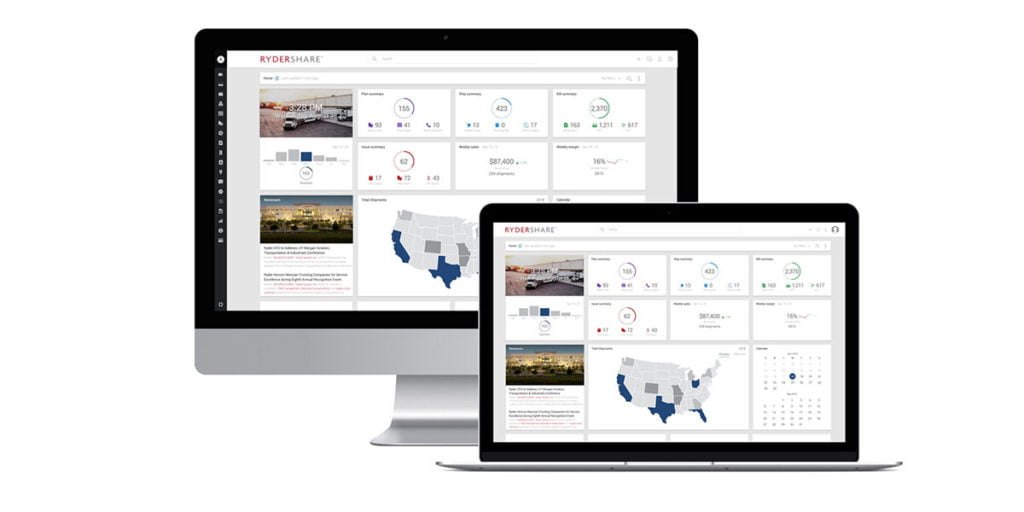Today, “logistics” refers to the effective flow of raw materials and completed goods across the supply chain.
By 2025, 5.95 trillion ton-miles of freight will be transported across the United States. A company will never be successful in the battle for profitability if its logistics are inefficient.
Thankfully, logistics management software enables organizations to make optimal routing and shipping decisions, control expenses, safeguard investments, and monitor the movement of items. Typically, such software automates processes such as the ability to:
- Track orders and shipments.
- Record payments.
- Manage and resolve exceptions.
- Update proof-of-deliveries (PODs).
- Assist with inventory control.
Why is a logistics platform right for your business?
Since the flow of goods drives cash flow, managing this flow should be a fundamental business concern. Positively or negatively, logistics management affects a company’s bottom line. It’s best to have technology improve the impact and not leave that to chance.
It provides excellent visibility that reduces costs.
Logistics management gives increased supply chain visibility. This enables firms to identify inefficiency better, control inventory levels, minimize supply chain issues, and control costs. Proactively monitoring inventory levels allows businesses to reduce overhead expenses, such as air shipping charges and the amount of storage space required.
It enables a great customer experience.
An excellent customer experience (CX) is the driving force behind repeat sales. By promptly and precisely delivering orders, companies enhance the customer experience.
With real-time tracking and monitoring capabilities, customers are informed about the location and status of their package at all times. This not only provides peace of mind but also creates a sense of transparency and trust between the business and the consumer, increasing brand loyalty.
It helps reduce losses.
Supply chain execution software aids in loss prevention in multiple ways. One way is that it keeps accurate inventory records so that the business always knows how many goods it has.
Companies can also monitor stock location and movement, preventing misplacement or diversion. In addition, solid logistics reduces spoilage and damage by maintaining ideal storage and transport conditions, such as temperature and moisture management.
By integrating technology, supply chain platforms provide real-time updates on product location, customs clearance, transportation routes, and delivery times. This information helps businesses stay aware of any potential risks or hold-ups that could lead to losses.
Logistics systems help companies optimize their supply chain by automating processes such as inventory management and order processing. Reducing manual interventions minimizes the chances of human error which also minimizes losses in terms of time and money.
Integration with existing systems and processes.
Logistics platform integration involves connecting different logistics solutions, such as transportation management systems (TMS), warehouse management systems (WMS), and enterprise resource planning (ERP) solutions, to create a unified platform that efficiently manages every aspect of the shipment process.
Through seamless integration, businesses access real-time data on inventory levels, order tracking statuses, and delivery times at any point along the supply chain. This information facilitates strategic decision-making for improving operational efficiencies, reducing costs, enhancing customer satisfaction, and ultimately growing revenue.
Given the importance of logistics in today’s competitive environment, incorporating an integrated logistics system is essential for success in supply chain management.
P.S. Wanna know how to easily connect all your important logistics systems such as your load boards, WMS, accounting platforms, etc.? Check out Turvo’s point-and-click integrations.
It improves warehouse management.
The logistics software’s warehouse management solution optimizes warehouse or distribution center management. It also enables the planning, organization, staffing, direction, and control of the industry’s use.
Efficient warehouse management systems allow for materials’ internal and external storage and movement. An efficient warehousing approach’s economic benefits accrue to corporations and customers.
It simplifies transport management.
A logistics platform manages the transit of products between their distribution and consumption points. It assists organizations in planning, executing, and optimizing the physical movement of goods.
With these platforms, it’s now possible to manage bookings, dispatching, and invoicing all in one place. The platform also comes with advanced tools such as route optimization algorithms that efficiently assist in fleet route management and reduce fuel expenses.
Additionally, it ensures that the shipment is compliant and that the necessary documentation is available.
Supply chain platforms ultimately simplify transport management by centralizing operations, enhancing communication between stakeholders and providing data-driven insights on areas where operational improvements can be made.
It provides data and analytics in real time.
Your business will access crucial data and freight accounting information using logistics software. The logistics analytics function that the system provides helps deliver a meaningful evaluation of the efficiency of logistics operations.
You can accomplish this when you thoroughly understand the functional metrics, including the shipping history. The analytical process becomes more accessible with a cloud-based collaborative platform. Businesses can plan their resource allocation for maximum growth using logistical planning software that incorporates optimization, simulation, and analytics.
Scalability for business growth and expansion.
As business needs change over time, the versatility of logistics platforms ensures that they adapt quickly to those needs and provide greater flexibility in responding to market demands.
Additionally, supply chain execution software provides valuable data insights that help businesses make better decisions on inventory management and resource allocation. With all these benefits, it’s clear that investing in cloud-based logistics software is an essential step for any business looking to scale up operations while maintaining cost-effectiveness.
Factors to Consider When Choosing a Logistics Platform
There are four main factors you should bear in mind when on the hunt for a good system that can handle all of your needs.
Integration with Existing Systems and Processes
When it comes to integrating with existing systems and processes, it’s important to ensure that the new system is compatible with the current infrastructure. This means that the new system should be able to communicate with the existing systems and processes seamlessly.
It’s also important to consider the impact of the new system on the current processes and workflows. Any changes to the existing processes should be carefully planned and communicated to all stakeholders to ensure a smooth transition.
Additionally, it’s important to train employees on how to use the new system and how it fits into the overall workflow. By taking these steps, organizations ensure successful integration with their existing systems and processes.
Scalability and Flexibility
Scalability and flexibility are two essential factors that businesses must consider when planning for growth and success. Scalability refers to the ability of a business to handle an increase in demand or workload without compromising the quality of its products or services. Flexibility, on the other hand, refers to the ability of a business to adapt to changes in the market, customer needs, or technology.
A scalable and flexible business quickly responds to new opportunities and challenges, stays ahead of the competition, and meets the evolving needs of its customers. Therefore, businesses need to invest in the right technology, infrastructure, and workforce to achieve scalability and flexibility.
P.S. Learn how cloud-based TMS allows companies to scale.
Customization and Personalization
Customization and personalization are key elements in today’s market. Consumers want products and services that are tailored to their specific needs and preferences. This is why businesses invest in technology and tools that allow them to offer personalized experiences to their customers.
From personalized recommendations to customized products, companies find new ways to make their customers feel valued and appreciated. By offering customization and personalization, businesses build stronger relationships with their customers and increase customer loyalty.
Businesses should adapt to the changing needs and expectations of their customers to stay competitive in today’s market.
Security and Data Protection
Ensuring the security and protection of data is of utmost importance in today’s digital age. With the increasing amount of sensitive information being stored and transmitted online, it’s crucial to have robust security measures in place to prevent unauthorized access, data breaches, and cyber-attacks. This includes implementing strong passwords, encryption, firewalls, and other security protocols.
Additionally, regular backups and disaster recovery plans should be in place to ensure that data can be restored in the event of a breach or system failure. By prioritizing security and data protection, individuals and organizations safeguard their valuable information and maintain the trust of their customers and stakeholders.
Does the Size of My Logistics Company Determine Whether I Should Use a Logistics Platform or Not?
The use of logistic platforms heavily depends on the company’s size. Companies need to assess their individual needs and consider factors such as scalability, automation capabilities, and cost-effectiveness when deciding which logistic platform suits them best.
Differences in Logistics Needs Between Small and Large Companies
When it comes to logistics, small and large companies have vastly different needs. Small businesses often have limited resources, which means they must carefully allocate their budget to ensure maximum efficiency. This ultimately leads them to rely on third-party logistics providers to handle their shipping and supply chain management needs.
On the other hand, large enterprises typically have dedicated logistics teams with ERP systems and warehouse automation technology in place. They also have an extensive network of suppliers and distribution centers that allows them to move goods quickly and cost-effectively across international borders.
Additionally, larger firms may leverage economies of scale by negotiating favorable rates with carriers due to the high volume of shipments they handle. Understanding these differences is critical for any business that wants to optimize its logistics operations and stay competitive in an ever-changing global marketplace.
How Supply Chain Platforms Benefit Companies of All Sizes
While the logistics needs of companies may vary based on their size, logistics management software benefits companies of all sizes, from startup brokerages to larger 3PLs. They offer a range of functionalities and tools that help businesses improve their logistics operations, regardless of size. These platforms are also scalable and flexible, enabling businesses to grow and adapt to changing market conditions.
P.S. Check out our Customer Stories to read up on how Turvo TMS supports various logistics business models.
Businesses utilize single-platform logistics management software to achieve a competitive edge in a market that is getting increasingly competitive. A modern, unified platform has replaced the siloed warehouse management systems, supply chain software, and transportation management software of the past.
With the capacity to connect to the cloud and track shipments from beginning to end, a unified logistics software solution opens doors, reduces costs for suppliers and consumers, and prepares logistics teams for success in the modern world.
Simplified Logistics Tracking with Turvo
If you are looking for great Collaborative TMS solutions, Turvo is the right partner. Turvo provides the world’s leading Collaborative TMS application designed for the supply chain.
Turvo connects people and organizations, allowing shippers, logistics providers, and carriers to unite their supply chains, deliver outstanding customer experiences, collaborate in real time, and accelerate growth.
The technology unifies all systems, internal and external, providing one end-to-end solution to execute all operations and analytics while eliminating redundant manual tasks and automating business processes.
Turvo’s customers include some of the world’s most considerable Fortune 500 logistics service providers, shippers, and freight brokers. Turvo is based in the San Francisco Bay Area with offices in Dallas, Texas, and Hyderabad, India.









